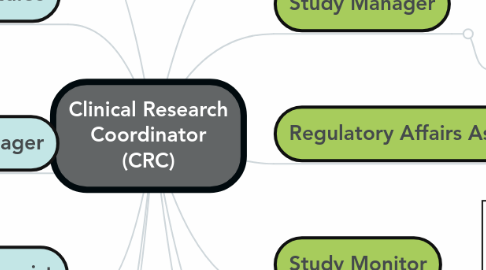Clinical Research Coordinator (CRC)
Door Katie Maschi


1. Investigator
1.1. Responsible for the conduct of the trial and leading the research team
1.1.1. Verbal and written communication
2. Clinical Research Assistant
2.1. Works under the supervision of the CRC. Completes administrative work and assists the clinical research team
2.1.1. Verbal and written communication
3. Patients
3.1. New participants are recruited and enrolled in the study
3.1.1. Verbal and written communication
4. Data Manager
4.1. Collect data required for the clinical trial which may include reviewing patients medical records. Also responsible for addressing any questions from the study sponsor concerning the data
4.1.1. Verbal and written communication
5. Research Nurse
5.1. Complete assessments on study participants, administer study drugs, obtain study samples, and complete appropriate safety reports when necessary
5.1.1. Verbal and written communication
6. Research Pharmacist
6.1. Responsible for managing the study drug and has knowledge of unblinding procedures if such becomes necessary. May also be responsible for ordering and maintaining investigational drug supplies at the study site
6.1.1. Verbal and written communication
7. Study Site
8. Clinical Research Associate (CRA)
8.1. Responsible for setting up the study site and reviewing the study protocol with the staff. The CRA works closely with the study manager and is the primary contact for the study investigator and research coordinator
8.1.1. Verbal and written communication
9. Study Manager
9.1. Responsible for overseeing the trial and helping resolve any issues that may arise. They will often work closely with a few CRAs
9.1.1. Written communication
10. Regulatory Affairs Associate
10.1. Provides support to the clinical trial and communicates with the Regulatory Authorities. They must ensure that all appropriate documentation for each study site is available and collected when necessary
10.1.1. Written communication
11. Study Monitor
11.1. Responsible for reviewing the data sent from the study site and ensuring that the site is sticking to protocol as well as other regulations
11.1.1. Written communication
12. Regulatory Authorities
12.1. Require appropriate documentation. E.g. Health Canada and the FDA
12.1.1. Written communication
13. Research Ethics Board
13.1. Review the ethical considerations for the conduct of a clinical trial
13.1.1. Written communication
